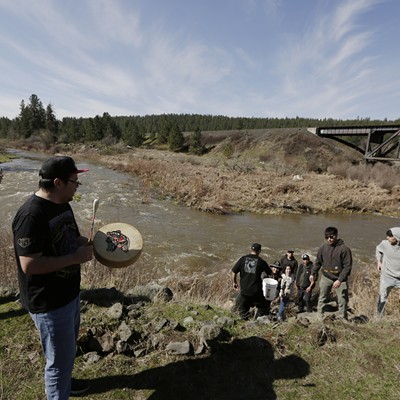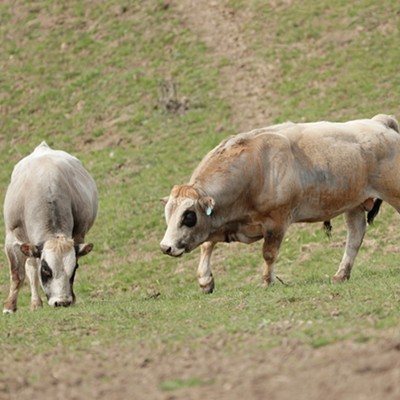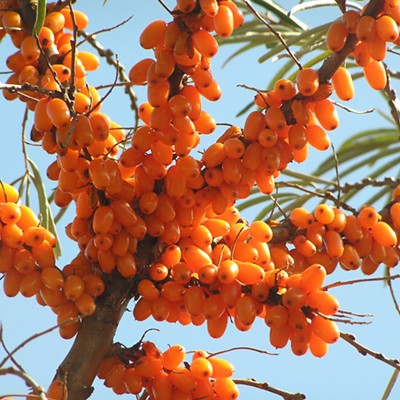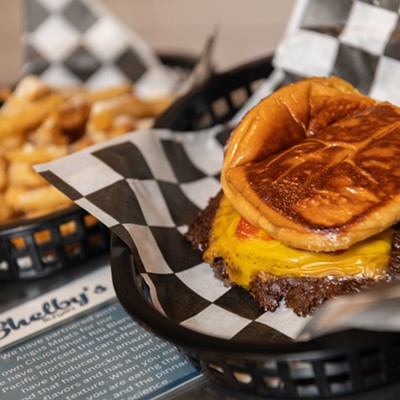It's the end of October at Hawley's Landing in Heyburn State Park in Idaho. Rocky Mountain maples and larch trees have turned patches of the mountains a golden yellow. Ponderosa pines are dark and shadowed, but outlined by a light dusting of snow. Below the ridge, Plummer Creek runs through a low wetland filled with sepia-colored tule grass. Scattered snowflakes swirl gently over the swamp, and it would be silent were it not for the sound of shovels overturning thick, black mud.
It's sqigwts ha'chesq'it, or water potato harvest day, for the Coeur d'Alene Tribe.
Traditionally, the beginning of winter would be the end of the gathering season for the Coeur d'Alenes. After spending the spring and summer months following camas, elderberries and huckleberries, they would come to the edge of the lake before the cold set in to harvest sqigwts, sometimes called "water potato" or "wapato" in English. The starchy root of a common marsh plant was an important part of their diet, especially since it could be dried and preserved all winter.
Today, the Coeur d'Alenes keep this tradition alive with communal sqigwts harvest days, open to tribal members, school students and the general public. On Oct. 25 and 26, visitors could come try their hand at harvesting sqigwts or watch as men from the Coeur d'Alene Fish and Wildlife Department dug in the mud for the purplish, egg-shaped treasure. Because of heavy metal contamination in the northern part of Lake Coeur d'Alene, the tribe is relegated to harvesting sqigwts in the southernmost part of the lake. In addition to harvesting, educational booths at the nearby campsite offer opportunities to learn about the Coeur d'Alene language, beaver lodges and ecological stewardship, hand-dug canoes, storytelling, and other traditional foods like smoked elk.
"We get a lot of elders and tribal leaders down here a lot of times," says Caj Matheson, a tribal council member and natural resources director for the Coeur d'Alene Tribe. "We just hang out and shoot the breeze. It becomes a communal event for us."
One booth offers newcomers the chance to taste sqigwts. It can be prepared in as many different ways as a potato can — boil it, mash it, stick it in a stew, and, perhaps the most tempting, deep fry it into a chip.
Val Wade, an environmental health specialist who works for the Coeur d'Alene Tribe, makes fresh sqigwts chips for kids and adults alike, which taste something between a potato chip and a plantain chip — crisp and starchy but with a subtly sweet, almost chestnut, aftertaste. It's not the most traditional way to eat sqigwts, but every family has their own favorite way to prepare them, and this could certainly be added to the list.
Hundreds of years ago, gathering sqigwts was women's work. They would wade into knee-deep water and disrupt the mud with their feet. Once sqigwts were released from the loosened soil, they floated to the top to be gathered into baskets or canoes.
Today, men from the Coeur d'Alene Fish and Wildlife Department wear waders and boots in ankle deep mud, breaking it up with shovels. You can see a line along the bank where the brush is pushed back, a telltale sign that the lake water is higher in the spring. But by October, the water recedes tens of yards.
"We have lost a lot of our traditional habitat due to the Post Falls Dam," says Jade Mokry, outreach specialist for the Coeur d'Alene Tribe. "The dam holds the water levels at an unnatural state. We do have to dig for water potatoes manually — we have to use shovels and boots, and we don't have the luxury of having the water."
Bryan Harper has been out in the 30-degree weather for two days, lifting and sifting through piles of cold mud for sqigwts. He's been part of this harvest for 22 years, ever since he started working for the tribe's fish and wildlife department. When he finds a root, he hands it to whoever's standing nearby. It's usually easier for Harper to dig out sqigwts than to let small children search for their own — it's easy for little people to get stuck in the mud and leave a boot or two behind trying to pull free. Harper remembers visiting the harvest as a kid in grade school. Now he's the one who gets to teach students about sqigwts.
"We're just trying to keep traditions alive and let the youth know what our ancestors went through," Harper says. "Ten thousand years ago they were doing this to make it through their winters."
Three other younger fish and wildlife technicians have spent the past two days pulling sqigwts and preschoolers out of the mud. They happily stay out to help a new group of kids in the marsh and snow.
"It's like a treasure hunt for them," says Daniel Peone, who's on his way to becoming a biologist for the tribe.
Peone and his colleagues, Jerry Martin and Silas Enick, also find "false" water potatoes in the mud, a similar-looking but different kind of underwater tuber that can make the eater sick. They make sure the kids know the difference between a smooth sqigwts with purplish skin and a football shape, and the poisonous alternative that is courser and rounder. The three young guys are good at keeping cold, wet children entertained.
"It's fun, man, it's cool seeing them happy," Martin says. "Most of the time it's our nieces or nephew or kids or family who we knew in school."
Reconnecting to traditional foods not only passes down memory and knowledge to new generations, but could impact health, too.
"What people are believing in, probably rightfully so, is that our bodies really have adjusted to the foods that have been here for thousands of years," says Matheson, the tribe's natural resources director. "So when we think about the last 100 or 150 years, having to adjust our diets to things that are very heavy on sugars and things like that, what we do know is that we have massive issues with obesity, with things like diabetes. The idea is, if we return to some of our traditional foods, that there will be a medicinal effect and impact on us. Some people will talk about an emotional, spiritual impact, and I don't disagree with that, either."
Visitors from the Kalispel Tribe came from Usk to join their sister tribe's sqigwts harvest. Their children sing a song that blesses the east, west, ground and creator before they leave. Their offering leaves some of the elders misty-eyed.
"We're super proud of the resource," Matheson says. "We're super proud of the event. We're proud that we're one of the few people that actually continue to harvest water potatoes and make use of them. They are also critical for us when we start thinking about doing things like cleaning up like the Coeur d'Alene River basin."
"We left here yesterday, it was so cold and snowy," he says. "But we left here just thinking that, even though our bodies were hurting, we had so much fun down there." ♦























